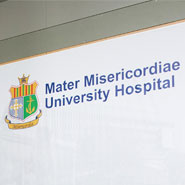Posted 17 April 2013
Thousands volunteer for HIV test as part of new research at Dublin’s Mater Hospital
A new rapid HIV-screening programme offered to patients who present at the Mater Misericordiae University Hospital Emergency Department in Dublin has already seen 2,250 people volunteer to check their HIV status.
It is estimated that nearly 30 per cent of people in Ireland living with HIV are currently undiagnosed, and this project aims to reach patients who might not otherwise take a HIV test.
The test is free, painless (mouth swab) and returns a result in 20 minutes. Patients who choose to participate in the project watch an interactive counselling video, complete an on-screen survey that assesses risk behaviour, and are then offered an oral swab HIV test.
Of the 3,000 people who watched the video and took the survey, 75 per cent (2,250) opted to take the HIV test.
The project known as M-BRiHT (Mater-Bronx Rapid HIV Testing) is a collaboration between University College Dublin, the Mater Misericordiae University Hospital, and the Jacobi Medical Centre in the Bronx, New York. It is directed by Dr Paddy Mallon, Consultant in Infectious Diseases and Associate Dean at the UCD School of Medicine and Medical Science, University College Dublin. He described the high participation rate as “very encouraging and proof that the majority will check their status when given the opportunity.”
While the vast majority of tests come back negative, patients who receive a positive result are immediately provided with access to specialist HIV care.
“Linking patients with immediate, expert care is essential. We are hoping to reach people with the early and symptom-free stage of HIV, so that they can get the most benefit from treatment and monitoring,” says Dr Ger O’Connor, an Emergency Medicine doctor who is project leader on M-BRiHT.
“Treatment and management of HIV has reached the stage where patients who are diagnosed early and receive appropriate treatment can realistically expect a normal lifespan. The message from this project is clear: know your status,” he says.
According to Dr Paddy Mallon, it is essential from a public and individual health perspective that patients with HIV are diagnosed and given access to expert care at the earliest possible stage.
“This project shows that voluntary screening, within emergency departments provides a feasible and acceptable method for HIV testing in the general population. A broad screening programme of this nature also helps to normalise HIV testing – everyone should know their status, whether positive or negative. We will use the results of the project to push for implementation of this model throughout Ireland’s emergency departments,” he says.
(Produced by UCD University Relations)

